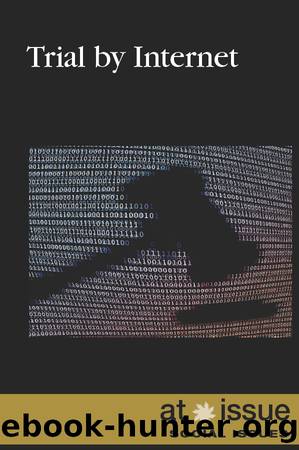Trial by Internet by Avery Elizabeth Hurt

Author:Avery Elizabeth Hurt
Language: eng
Format: epub
Publisher: Greenhaven Publishing LLC
ORIâs Response
John Dahlberg, director of the division of investigative oversight at the ORI, did not speak about any of these particular cases, but acknowledges that having an official record of misconduct is a âheavy burden.â However, the ORI has no control over the NIH Guide or the Federal Register, and canât take down its annual reports when they contain notices that have expired, he says. The agency does remove the names from the Administrative Actions listing once the penalty period is up, Dahlberg notes, because that information typically comes up very quickly in an online search. Still, he adds, there is a public benefit to making misconduct findings public, and easily retrievable. For every case of misconduct the ORI catches, there are many more the agency misses, Dahlberg says, and announcing every guilty finding sends a message. âItâs creating a deterrent effect. When we publicize findings of misconduct, it makes people more aware of the consequences of their actions.â But to the scientists at the heart of misconduct findings who want to continue their careers, the public benefit offers little consolation, he adds. âThereâs collateral damage. I regret it.â
If you type his full name into Google, the first article that appears is the notice of misconduct. (In part because of that, Levick now publishes mostly under âGerry,â not âGerald.â) The night he and I met in his office, Levick flew to Israel to deliver a lecture and discuss more details about another offer he just received from a âmajor universityâ there. His contract at Touro ends June 30, and he has nothing lined up. Again, that offer from the Israeli university fell through at the 11th hourâthe result, Levick believes, of the public information about his voluntary exclusion agreement, which ended 12 years ago. âIâm angry as hell,â he says. âAnd thereâs nothing whatsoever I can do about it.â
After his wife died 3½ years ago, John Franklin, 67, started dating again. On a first date, a woman asked him about something sheâd found on Google. As of this spring, if you put his (real) name into the search engine, the eighth entry is a 1990 news article about concerns that a blood test to detect cancer that Franklin developed didnât perform as he claimed. Six entries below that is the NIH Guideâs entry about Franklin. It stated that he fudged data in a grant application to show that the test was more accurate, sensitive, and specific than it was. He was barred from federal funding for 3 years.
Franklin explained to the woman that he, in fact, was the person in those articles. Had he known that the details would be so permanently fixed on the Internet, however, he says he never would have signed the document accepting the ORIâs ruling of misconduct. But it was the mid-1990s, before the Web became such a fixture itself.
Franklin doesnât dwell on the details of his case or replay the decisions he made. Much of it he can no longer remember, though he does recall contacting the ORI once he realized his case was so prominent and permanent.
Download
This site does not store any files on its server. We only index and link to content provided by other sites. Please contact the content providers to delete copyright contents if any and email us, we'll remove relevant links or contents immediately.
Pale Blue Dot by Carl Sagan(5008)
Cracking the GRE Premium Edition with 6 Practice Tests, 2015 (Graduate School Test Preparation) by Princeton Review(4294)
Pocahontas by Joseph Bruchac(4260)
Unfiltered by Lily Collins(4004)
The Emotionary: A Dictionary of Words That Don't Exist for Feelings That Do by Eden Sher(3365)
The Daily Stoic by Holiday Ryan & Hanselman Stephen(3324)
The 48 laws of power by Robert Greene & Joost Elffers(3292)
Factfulness_Ten Reasons We're Wrong About the World_and Why Things Are Better Than You Think by Hans Rosling(3239)
The Innovators: How a Group of Hackers, Geniuses, and Geeks Created the Digital Revolution by Walter Isaacson(3211)
The President Has Been Shot!": The Assassination of John F. Kennedy by Swanson James L(3103)
Sapiens and Homo Deus by Yuval Noah Harari(3071)
Rogue Trader by Leeson Nick(3045)
Gettysburg by Iain C. Martin(2836)
The Rape Of Nanking by Iris Chang(2824)
Almost Adulting by Arden Rose(2710)
The Plant Paradox by Dr. Steven R. Gundry M.D(2621)
In the Woods by Tana French(2599)
500 Must-Know AP Microeconomics/Macroeconomics Questions(2572)
Make by Mike Westerfield(2321)
